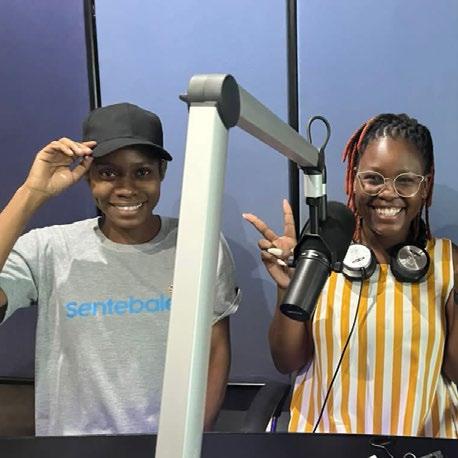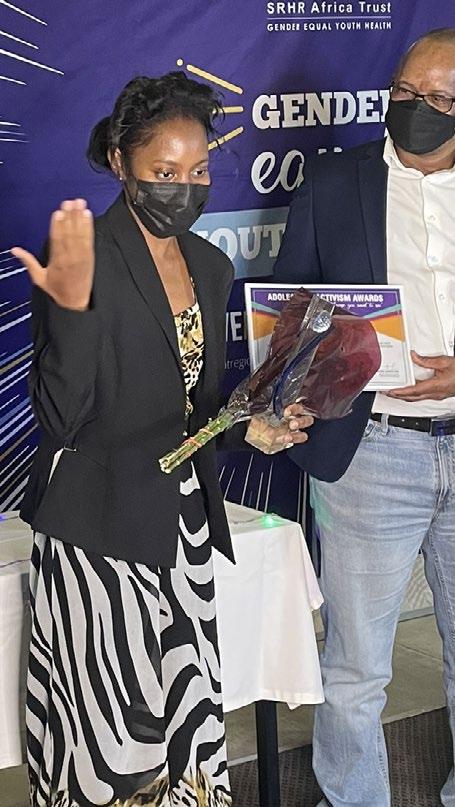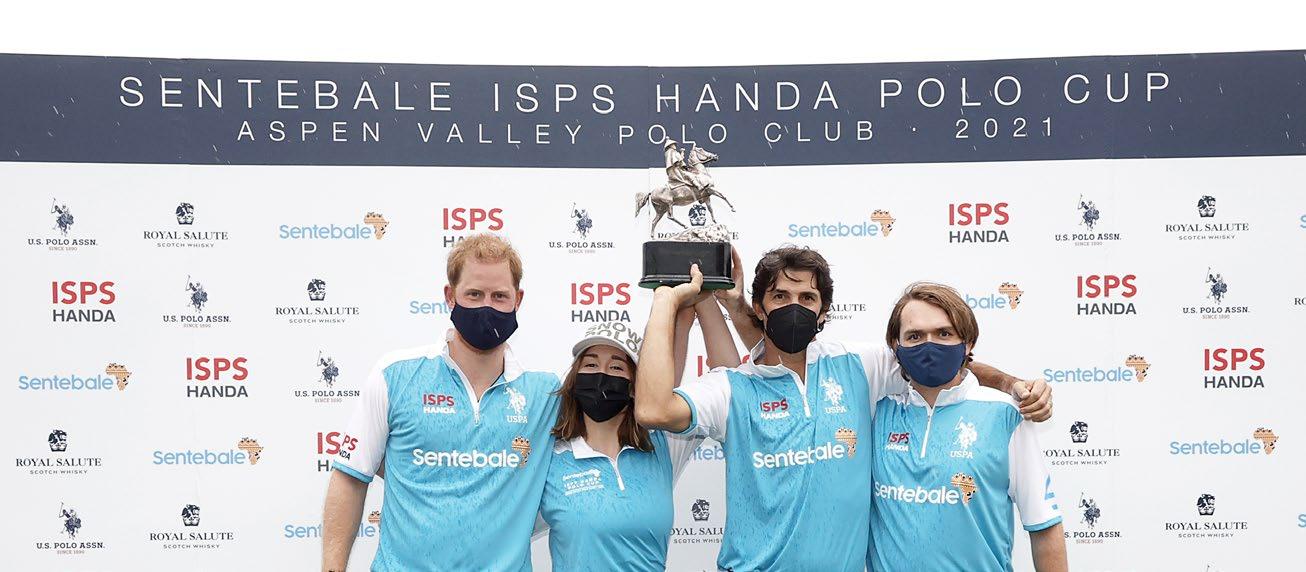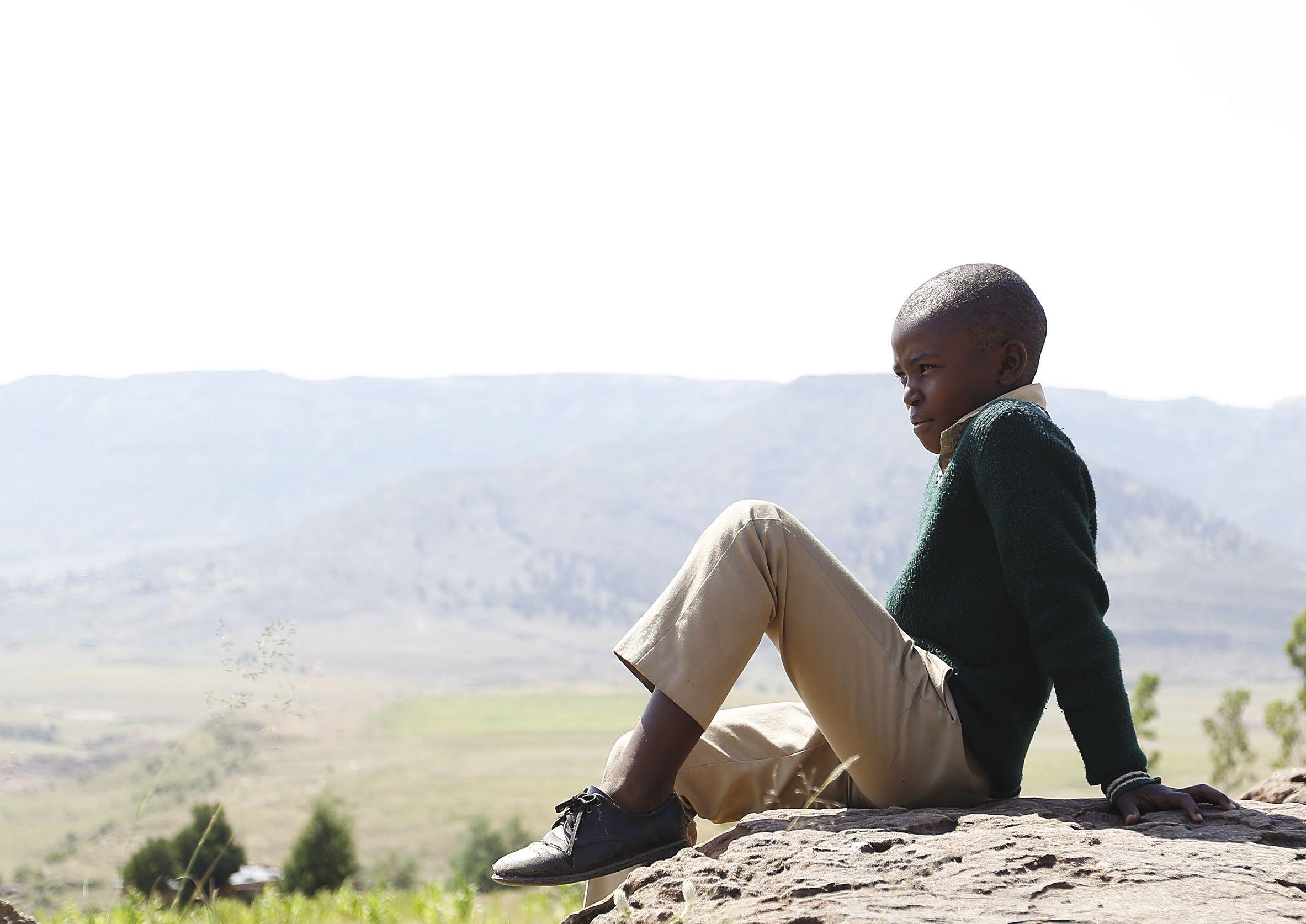
15 minute read
Impact of Covid-19
by Sentebale
STRATEGIC OBJECTIVE 2: NURTURING COMMUNITIES
We work with local and national partners to provide health and social services for children and young people in a friendly, safe environment.
Advertisement
OUR OUTCOMES
We believe everyone in the community has a shared responsibility to ensure children and young people grow up in a safe and nurturing environment where their needs are met. We want:
• Children and young people to access youth-friendly services offered by national and community stakeholders • Improved and effective collaboration between local service providers ensuring greater support, protection and inclusion
ACHIEVEMENTS IN LESOTHO & BOTSWANA
In Lesotho, parental engagement sessions were carried out providing parents, caregivers, and community leaders information on youth-friendly services and how to access them, covering topics such as sexual and reproductive health and rights education, gender-based violence, and guidance on parent-child communication.
Over 1,200 caregivers were reached with messaging on gender-based violence and human rights. In Botswana, a skills building activity was conducted in the Mabutsane district involving 32 children and 30 caregivers. The session built upon the learning at our Let Youth Lead Advocates Mental Health Retreat, July 2021, and addressed mental health challenges which have been magnified by Covid-19, as well as stigma towards children or youth living with HIV, its impact on adherence, and poor parentchild communication leading to tensions within the families.
Let Youth Lead advocates were speakers, moderators, and facilitators of national and regional online engagements. Topics included the realities and experiences of young people and actions to be taken to address them. This opened doors for our advocates to take an advisory role on Global Fund proposals and priorities together with representation and input in other forums.
It takes a village to raise a child.”
HEALTH CENTRE STAFF SAVE YOUNG BOY’S LIFE
Thato is a 12-year-old living with HIV from Lesotho’s capital city, Maseru. He lost his mother when he was just three-weeks-old and has since been raised by his grandmother with limited support from his father. He is enrolled in Sentebale’s Network Clubs and Camps programme for children living with HIV. Over the years, he has struggled with feelings of abandonment. When his father remarried, deserting him completely, Thato gave up on life and refused to take his medication.
Thato’s viral load increased and his attitude during the Sentebale club meetings changed. He stopped participating in the activities, withdrew and picked fights with his fellow clubbers. His attitude and change in viral load raised concern with club leaders and healthcare workers.
“Thato came to one of the facility staff members one day to tell her that he hated his father and would stop taking his medication so that he would die. This was the last straw; this is when we decided to
do a home visit,” said the healthcare worker at the facility. A meeting was scheduled with Thato’s grandmother and father. During the meeting the facility staff explained the importance of supporting Thato not just physically but emotionally as well. They emphasised the importance of his father’s presence in his life. They stated that the situation at home really affected Thato and if it did not change, he would fall ill as he had stopped taking his medication. Since the meeting, Thato’s father has been present in his life and his wellbeing has improved with him taking his treatment, feeling happier, and participating in club activities. Thato sometimes comes by the facility to tell us that he is getting immense support from his father and that things have changed for the better since the meeting.”
HEALTHCARE WORKER
STRATEGIC OBJECTIVE 3: YOUTH ADVOCACY
We believe young people should shape their own future and be given the opportunity to advocate for improved health, education and social protection.
OUR OUTCOMES
• Young people understand their rights and responsibilities in line with practices and policies that affect them • Young people are successfully motivating peers and others in their communities to become advocates for themselves and their communities • Young people’s lifestyle, behaviour, and rights are improved through the design and implementation of sound and relevant policies from a national level
ACHIEVEMENTS IN LESOTHO & BOTSWANA
In Lesotho, peer educators delivered human rights and gender-based violence information to over 4,000 adolescents and young people. Referrals were made for those requiring additional support as a result of sexual and gender-based violence. Our Let Youth Lead advocates informed over 9,500 young people aged between 10 to 24 years old of services they are entitled to access at health facilities. They used a social accountability tool to assess the quality of services received at the facilities by young people. In Botswana, Let Youth Lead advocates have participated in platforms where they were able to directly influence policy decisions. Notably, they were actively engaged in the national consultation process and development of a National Strategic Framework for Youth Empowerment and Engagement; the process was coordinated by The First Lady of Botswana in her capacity as the UNAIDS Special Ambassador. They also participated in the virtual AIDS 2020 conference, regional meetings by UN agencies, contributions to the Global Fund and PEPFAR in-country processes and regional and national meetings with fellow community-based organisations. Media platforms such as our Radio Positive Show on DUMA FM and our local Facebook page have been beneficial in amplifying the voices of young people. One of our advocates received the Citizen Journalism Award for their work on our Radio Positive.
A YEAR IN REVIEW FOR SENTEBALE’S LET YOUTH LEAD PROGRAMME IN BOTSWANA BY BOTLHE JULIET MOOKETSI
The Covid-19 pandemic disrupted our normal work as Let Youth Lead Advocates for another year. School outreach had to be completely stopped and we were not able to do as many community outreaches as we would have liked.
However, the year was not a complete loss we were able to still host our weekly Radio Positive show on DUMA FM, hosted by two of our lovely advocates Bakang Garebatho and Sekgabo Seselamarumo. The hour-long show focuses on youth and HIV, and aims to strike a balance between fun discussions and talking about health, HIV and other issues such as Covid-19 which affect young people. Feedback from the radio station has been great and showed that the conversations are very much needed amongst our generation. Young people are listening and hearing the importance of knowing and accepting their HIV status. Parents and caregivers have got in touch asking important questions which help deal with the issue of parent-child communication. Through weekly mental health checks via our WhatsApp group, it is clear the pandemic has led to a rise in mental health issues for many young people. In line with government guidance, a Mental Health Retreat was held in July 2021 for advocates to come together and receive professional support and guidance from our partner organization, Botswana Network for Mental Health. During the retreat, there was information and discussion on all mental health issues together with signs to look out for and help available. Feedback showed this retreat brought a refreshing and much needed rest and emotional support. Some of our advocates have begun counselling and therapy through Botswana Network for Mental Health and through a private therapist. Their learning has been shared with the Mabutsane community through a skills-building workshop and via input from the First Lady’s, Youth Empowerment and Engagement Strategic Framework, and our Radio Positive show. While this year was difficult, we are grateful to Sentebale and the Let Youth Lead Programme for being the light for many of us through such a dark time. We are ready to grow and hopeful that 2022 will be a better year for us as advocates. While this year was difficult, we are grateful to Sentebale and the Let Youth Lead Programme for being the light for many of us through such a dark time.” SENTEBALE LET YOUTH LEAD ADVOCATE
STRATEGIC OBJECTIVE 4: EDUCATION & LIVELIHOODS
We work with young people so that they are more resilient, self-confident, and empowered members of their communities.
OUR OUTCOMES
• Young people benefit from improved opportunities to complete formal education and/or learn new life skills • Young people are more able to economically support themselves within their communities • Young people find new, innovative ways to work towards sustainable economic well-being for themselves and within their communities
ACHIEVEMENTS IN LESOTHO & BOTSWANA
In Lesotho, we delivered secondary school bursaries and education subsidies to 223 young people and linked many to the Ministry of Social Development’s Scholarship Programme where they will continue to receive funding for their education. Peer educators ran Worth Groups to 613 adolescent girls and young women where 64 new businesses were established. Peer educators and our partners worked with households to improve food insecurity by developing skills and cost-effective methods to grow and maintain vegetables across three districts in Lesotho.
As part of the DREAMS programme, DREAMS mentors ran safe space sessions to over 370 girls and young women aged between 20 to 24 years.
WORTH is a micro-banking programme which empowers women to lift themselves and each other out of poverty. Worth’s model brings women and older girls together in groups of 20 to 25 to save money, access credit, and start their own businesses.
Once the groups are set up, they also become a platform for women to talk about other issues that affect them including those around health and human rights. DREAMS is a movement that empowers adolescent girls and young women to be bold, healthy, and reach their goals, leading to an empowered AIDS-free generation.”
KEINEETSE CANA OSUPILE
DREAMS MENTOR MEET THOBO, DREAMS GIRL, BOTSWANA
My name is Thobo Mothuti, I am an enthusiastic and diligent Motswapong lady aged 23 years from Bobirwa District in Botswana.
I am a shareholder at Tholef investment Pty Ltd presently and in possession of a Junior Certificate Education (Form 3). I am currently also engaged as a volunteer at the Government’s Tirelo Sechaba (National Service) programme in Borotsi Primary School in Bobonong.
There are several challenges that us adolescent girls and young women face, such as lack of funds to start up our dream business ideas, peer pressure, alcohol, and drug abuse to mention a few. Fortunately for us in the Bobirwa District, DREAMS has provided us with an opportunity to better tackle those challenges. Safe spaces are very impactful as we (DREAM Girls) can interact, share our experience and ideas in a free environment without fear of being judged or ridiculed.
Through safe spaces and my mentors support, I have acquired a lot of survival skills including building my selfconfidence. Before joining Sentebale’s DREAMS programme, I was an extremely shy girl, unable to share my problems or voice out my opinions, but with time, I noticed my confidence dramatically improving. Currently, I feel my confidence and self-esteem is at its best, both during safe spaces, at work and elsewhere.
We have also been given sessions on money management, including the importance of budgeting as well as saving. These skills now help me to manage my funds efficiently by drawing up a spending plan before the actual spending happens, something I wasn’t accustomed to before.
With the way things are going, I am very positive that my life is indeed on the best track, and I am not sceptical about my future anymore as I spend wisely, budget, and save.
My favourite thing to do during safe spaces is to socialise and gain knowledge from others. I would like to advise other adolescent girls and young women to attend safe spaces, open-up during sessions, and never to give up in life regardless of the situation they are facing. I would like to advise other adolescent girls and young women to attend safe spaces, open-up during sessions and never to give up in life regardless of the situation they are facing.”
THOBO
DREAMS GIRL


SENTEBALE ISPS HANDA POLO CUP
Our annual Sentebale ISPS Handa Polo Cup was finally able to return in August 2021, in a reduced version, hosted at the beautiful Aspen Valley Polo Club. The match and a dinner for donors the night before were hugely successful. This flagship event has now been running for over 10 years in different locations across the globe and has raised nearly £8 million to date.

THE DUKE OF SUSSEX’S DONATION TO SENTEBALE
At the time of the Polo Cup, Prince Harry generously committed to donating US $1.5million to Sentebale, enabling us to continue operating at full scale and providing critical services to at-risk youth in Southern Africa. The donation has subsequently been received by Sentebale and will be included in next year’s Report and Accounts. Our refocussed mission at Sentebale is about addressing the most-immediate needs of vulnerable children in Southern Africa, helping them access vital health services, receive necessary care, and build skills to be more resilient and self-sufficient in the future.
The Sentebale Polo Cup is critical to securing the funds needed to advance this important mission, and I’m thrilled to be able to support Sentebale, both in person and financially through a separate charitable donation to meet this immediate need.
This is one of several donations I plan to make to charitable organisations and I’m grateful to be able to give back in this way for the children and communities who gravely need it.”
THE DUKE OF SUSSEX
CO-FOUNDING PATRON OF SENTEBALE
SPOTLIGHT ON FUNDRAISING
FUNDRAISING OVERVIEW
Our fundraising has three main sources – events income; individual and major donors, including trusts, foundations, and corporates; and institutional funding which is primarily raised directly in Lesotho and Botswana. Our events-based fundraising was hard hit by Covid-19 and we were unable to run any events for over 18 months. Thankfully our supporters and sponsors were flexible with their funding, allowing us to use funds ahead of events taking place and making significant additional donations. After a difficult period, we are grateful to all our generous supporters who enabled us to end the year in a much stronger position than we started, with increased income compared to 2020.
FOUNDATION & CORPORATE SUPPORT
We continued to receive generous support from several foundations and businesses. This includes:
Gary D. Magness Family Foundation and The Marshall Foundation
who gave us vital programme funding that enabled us to continue meeting immediate needs of children and young people in Southern Africa during the uncertainty of Covid-19.
The Anglo-American Group
continued their support of our work in Botswana completing an 3 year programme of funding.
ISPS Handa, U.S. Polo Assn.,
and Royal Salute continued their generous support of the Polo Cup.
INSTITUTIONAL FUNDING
Institutional funding is vital to strong programme delivery, and we were delighted to secure two new significant contracts last year. In Botswana, we started the first year of the DREAMS programme with funding from USAID’s PEPFAR programme. In Lesotho, we began a new programme with the Elizabeth Glaser Paediatric AIDS Foundation (EGPAF) with funding from Centers for Disease Control and Prevention (CDC), and continue to receive funding from UNICEF in Lesotho and Diamonds Do Good in Botswana.
ONE MILLION METRES ROWING CHALLENGE
Adam Bidwell, a long-standing supporter of Sentebale, together with a group of close friends rowed an incredible one million metres on an indoor rowing machine in 22hrs raising vital funds for our work in Lesotho.


FUTURE PRIORITIES
Our main priority in 2022 is to move ahead with delivering the Sentebale strategy. Since its launch in 2020 we have been held back from fully implementing the strategy due to Covid-19.
This Annual Report has described how Covid-19 has forced us to adapt our approach – either by working in new, innovative ways or, where we have sadly had to cutback due to limitations of finance or an inability to be able to effectively meet and work with children and young people.
In the year ahead we will continue to proceed cautiously; taking account of all that we have learnt since our inception and especially the changes over the last two years. We are very aware the Covid-19 pandemic forms a large part of the context within which we work.
OVER THE NEXT YEAR WE WILL:
• Review our ‘clubs and camps’ programme within a forward-looking context to consider what are the best ways to enable young people affected by HIV to live happy, hopeful lives. • Strengthen our programme development and monitoring and evaluation capacity. • Invest in technology that will improve programme delivery and our ability to monitor impact. We hope this will improve our ability to provide up-to-date health advice to community health workers and reach out cost-effectively to young people. • Review our approach to programmes focussed on young people generating income. This will take into account and build on our learning from the Worth, SILC, and keyhole garden programmes in Lesotho and the DREAMS and Let Youth Lead programmes in Botswana. • Consider new programmes in response to the impact of Covid-19, especially those that build on our existing expertise in psychosocial support and can help tackle the rise in mental health issues. There are also the challenges of worsening gender-based violence and teenage pregnancies cases. • Aim to broaden our funding base with new institutionally funded programmes and develop inroads for a new fundraising strategy seeking new major donors.





